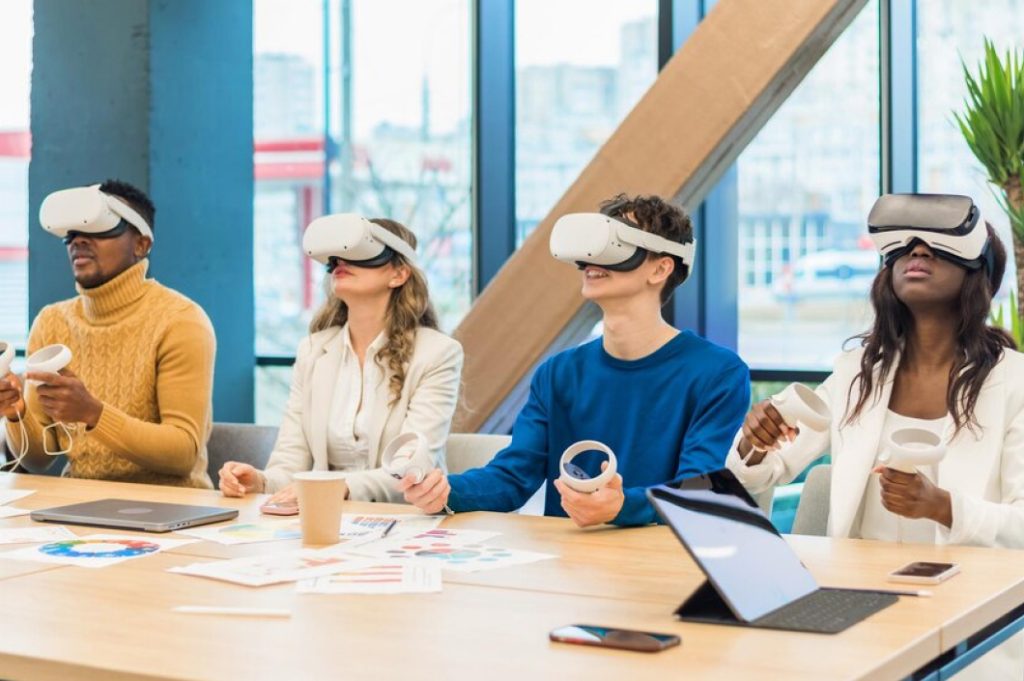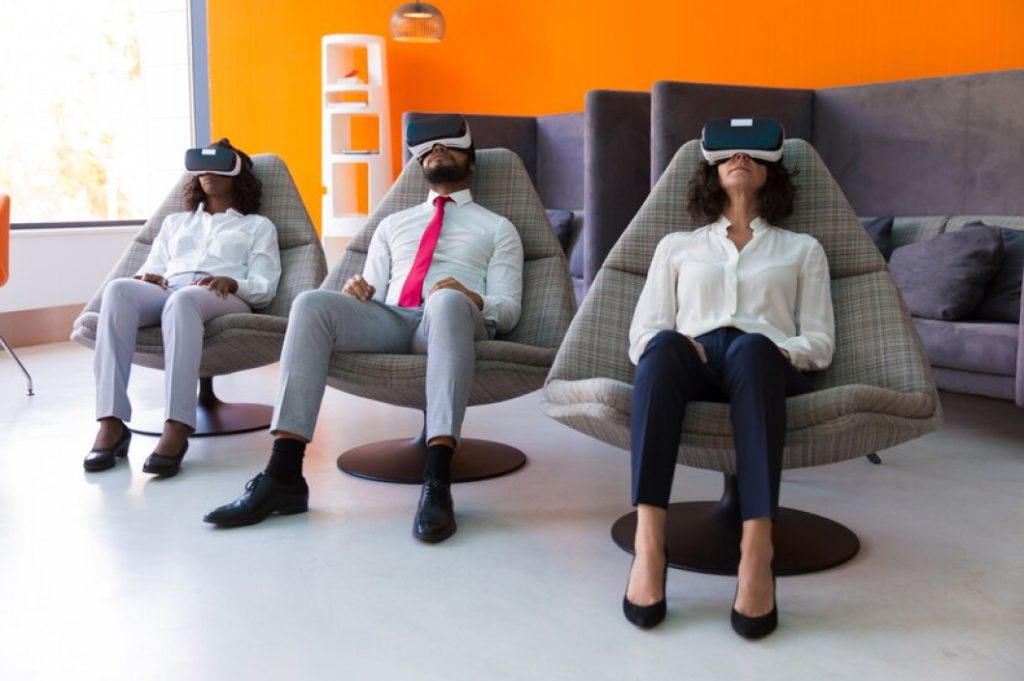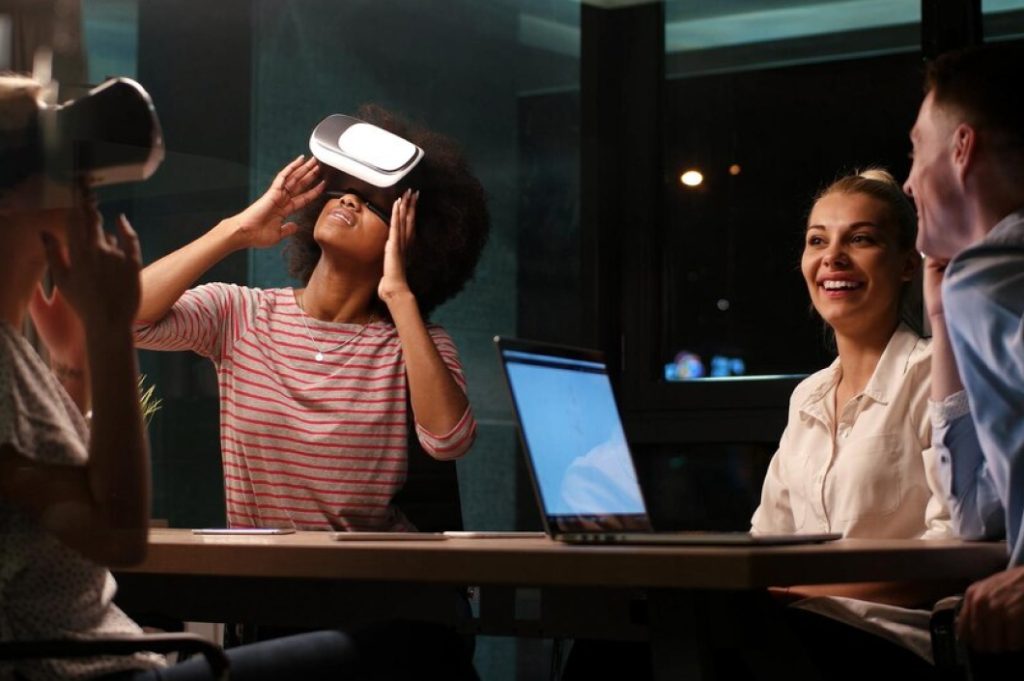How Virtual Reality Training Helps Businesses

Is your company ready to embrace the potential of virtual reality (VR) training? With the corporate landscape evolving rapidly, from remote work to the lingering effects of COVID-19, the importance of a skilled workforce has never been greater. Amidst these shifts, innovative approaches to skill development are crucial. Could VR training from a trusted virtual reality training company be the solution your company is seeking?
What Is Virtual Reality Training?

VR training offers an immersive learning experience by recreating real-life scenarios and simulating workplace challenges. It provides employees with hands-on training in a risk-free environment where they can learn by doing. The retention rate of skills learned in VR is notably high, increasing the likelihood of their application in real-world settings and enhancing productivity.
According to a report by PwC, learners trained in VR were four times faster to learn and 3.75 times more emotionally engaged than in traditional classroom training. One of the critical advantages of VR training is its ability to replicate hazardous work conditions, offering a safe space to practice high-risk skills. This makes VR training particularly appealing in defense, aerospace, and oil & gas industries, where it can simulate potentially life-threatening scenarios without compromising safety.
Virtual reality training is also invaluable for highly technical fields where errors can be costly. For instance, VR is increasingly used in medical training, allowing surgeons to practice intricate procedures. In engineering and construction, VR training enhances performance and fosters collaboration.
Moreover, with the integration of artificial intelligence, VR offers a responsive environment for learning soft skills such as management, public speaking, and customer service. The benefits of virtual reality training extend to improved professional development and employee motivation levels. This, combined with enhanced efficiency, reduced downtime, and potential cost savings, makes VR training an essential tool for businesses committed to long-term success.
Virtual Reality Training Advantages and Disadvantages

Consider the following advantages of Virtual reality training:
- the immersion effect creates a realistic learning environment, enhancing engagement;
- trainees can practice risky tasks without real-world consequences, reducing potential injuries and costs;
- eliminates the need for expensive equipment and physical materials, lowering training expenses;
- offers flexibility in timing and location, allowing convenient access to training materials;
- supports simultaneous training of multiple participants, improving efficiency and scalability.
These advantages make virtual reality training valuable for healthcare, manufacturing, construction, aviation, and military industries.
While virtual reality training presents numerous benefits, it’s essential to acknowledge its drawbacks:
- Cost considerations. Developing or procuring suitable software, conducting train-the-trainer programs, and acquiring VR equipment can pose significant expenses, particularly for budget-constrained enterprises.
- Technological limitations. Despite advancements, technical constraints such as limited field of view, resolution, or graphics quality may persist, impacting the learning experience.
- Potential discomfort. Some individuals may experience eye strain or pain when using VR headsets for extended periods.
- Lack of physical sensations. Virtual reality may not fully replicate tactile sensations or physical feedback, limiting training effectiveness for specific skills that rely on hands-on experience.
- Limited control over student behavior. Trainers may have limited control over student behavior within the virtual environment, posing challenges in addressing real-time learning needs effectively.
By understanding these pros and cons, companies can make informed decisions regarding the suitability of virtual reality technology for their training needs.
Improved Learning Outcomes with VR Training

Monitoring and evaluation are crucial components of your VR training strategy. Immersive educational experiences are widely lauded for enhancing knowledge retention by allowing employees to learn through hands-on practice and repetition.
Users of VR training overwhelmingly report feeling better prepared for their roles. However, the effectiveness of VR training is not merely subjective; performance data and evaluation support it.
Performance data from VR training sessions can be easily captured, providing accurate assessments of individuals’ abilities and tangible evidence of the learning process. Enhancing knowledge retention makes employees more likely to apply their newfound skills in the workplace, ultimately boosting productivity and benefiting the business.
Industries That Benefits From Virtual Reality Training
Virtual Reality has several benefits for business that you already know but do you know which industries gain more to benefit from VR training. In this section of the article we are discussing industries that will benefit the most from VR training. With rapid technological development it’s not far that these industries will reap lots of advantages by integrating VR training into their business or industry.
Healthcare
VR training can help immensely in the healthcare industry. Through the VR system, Ease VRx cognitive behavior therapy can be offered to reduce pain. Not only that, Ease CRx can also offer interoceptive awareness along with other behavioral principles to decrease pain.
Virtual reality training can also help treat patients with phobias or anxiety or PTSD through the Virtual Reality Exposure Therapy.
Tourism
VR changed the tourism industry during the pandemic when people were stuck at home and had nowhere to go. VR tourism can change the way we travel as through virtual reality we can see Paris or walk along the beaches of Portugal.
Retail
Retail has forever changed after the introduction of internet and ecommerce sites. But virtual reality has even more power to change retail in the future. Already virtual reality has been used to try on clothes to add to cart or to see a specific furniture fit in a place. Already eBay, a very well known brand, has collaborated with an Australian retailer, Myer to launch its first VR departmental store.
Aviation
VR training can help train pilots and improve their flying skill immensely. In a risk-free environment or creating situations that pilots might have to deal with while on air can help create an overall experience for training pilots.
Airbus implemented VR to get its pilot acquainted with its new aircrafts, its interiors and designs to smoother the transition to new aircrafts.
Customer Service
VR training helps improve customer service as well by providing immersive training to enhance skills of employees. They can interact in a risk-free environment through VR and improve their skill for face-to-face interactions.
Manufacturing
VR enhanced the manufacturing industry as well by enabling quicker prototype of products to safer training and guidance to employers.
Is Virtual Training the Future?
Embracing innovative training programs is essential for companies adapting to our evolving world, especially amidst globalization and remote work. With recent advancements in immersive technology, VR training presents an ideal solution to keep employees highly skilled, motivated, and productive when peak performance is crucial. Thus, the real question isn’t why you should consider VR training innovations but why you haven’t already used them.
Read More…
Maximizing Business Storage In Calgary For Efficiency And Growth
How Can You Arrange Cost-Effective Business Travel For Your Business?
Top Software Development Trends: Guide For Business Development
10 Ways Small Businesses Can Benefit From Digital Fax

























Leave A Reply